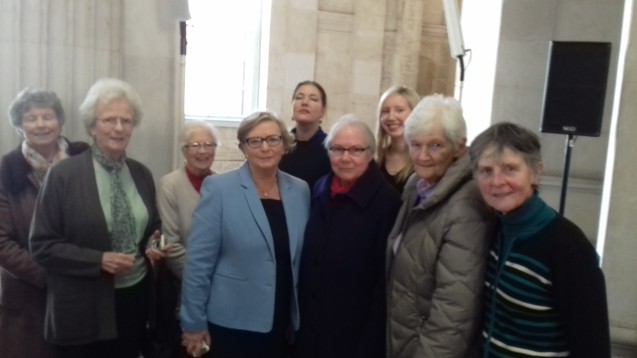
Nyambura
When my sister Precious left home I was lonely and missed her every day. She was five years older than...
read more
The Irish Government has recently passed a very important law which must be seen as a major breakthrough in the effort to tackle the issue of the trafficking of women and children for the purpose of sexual exploitation. The Republic of Ireland has adopted the pioneering approach implemented almost twenty years ago by Sweden and followed more recently by Norway, Iceland, France, and Northern Ireland. The key change with the new law is that the purchase, rather than the sale, of sex is now illegal.
The enactment of this new legislation comes as a result of a major campaign, extending over eight years, by a movement called “Turn Off the Red Light (TORL).” This consisted of a collaboration by more than seventy agencies, including trade unions, associations of doctors and of nurses, academics, women’s associations, “The Men’s Development Network,” “Act to Prevent Trafficking (APT),” and two agencies with which APT has been working very closely—“Ruhama,” and “The Immigrant Council of Ireland (ICI).” The legislation was eventually backed on a cross-party basis by all the major political parties and by most of the independent representatives in the Irish Dáil and Seanad; the Irish Minister for Justice and Equality, Frances Fitzgerald, played a major role ensuring that the law was passed.
This took place in spite of very strong opposition mounted by a small but persistent group of sex trade advocates called “Sex Workers Alliance of Ireland”. This group was strongly supported in the Dáil by two or three independent deputies. They argued that the way forward should have been to de-criminalize prostitution, as has been done in New Zealand. The problem with this approach is that experience has shown that it does not provide effective safety for women in prostitution and actually leads to an increase in the number of trafficked women and girls. In fact it can lead to the development of enormous brothels where commercial prostitution is treated as just another kind of business, as has happened in Germany.
This new law is radical and was seen as quite controversial. One argument put up by those who opposed it was that it discriminated against men, who are the main “buyers” of sex. Another of their arguments was that such a law would deprive women of a legitimate way of earning money. A third argument was that such a law would drive prostitution underground and make it more dangerous for those who engaged in prostitution.
A main argument in favour of the new law is that it has been shown in Sweden and elsewhere that it is the only really effective way of tackling the major criminal “business” of human trafficking. This is an activity which earns criminals billions of euro, comparable in size to the money made by the criminal drug gangs, and by those who sell arms. It is reliably reported that in Ireland alone the sex trade generates about €250 million annually in profits. It is now well known that in fairly recent years there has been an enormous change in relation to prostitution in Ireland and other Western countries. Up to about twenty years ago most women who engaged in prostitution were local poor women. Nowadays, the great majority of women in prostitution are young, even very young, women from Eastern Europe, Africa, Asia, or Latin America. And a very large number of these women are people who have been trafficked by criminals and are effectively slaves of their traffickers, moved from town to town every couple of weeks to minimize their possibility of escape from the criminals who control and ruthlessly exploit them.
For years, police in Western countries have tried to tackle this growing criminal enterprise. But the criminals have almost always managed to stay a step ahead. For instance, prostitution now takes place mainly indoors and solicitation takes place online and by the use of mobile phones. So the number of people convicted of the crime of trafficking is tiny—in fact almost non-existent—compared to the huge numbers of women who are tricked, raped, exploited, and sold by the criminals.
Those who were opposed to the new legislation often claimed that those who want the law changed were just out-of-date religious people and radical feminists. To counter this slur the TORL campaigners, including those who were faith-based, put the emphasis on human rights rather than on specifically religious arguments. In fact many of those who campaigned in favour of the law are utterly convinced that prostitution is by its very nature, and independently of whether or not the woman has been trafficked, a fundamental offence against human rights. They maintain that the invasion of a person’s body is not something that may ever be treated as a commodity to be bought.
It is likely that a significant consideration which motivated many of the legislators to pass the law is the practical argument that it would greatly reduce human trafficking. The key point is that, whereas in the past the police were trying, and largely failing, to limit the *supply* of trafficked women, there are good grounds for believing that the new law will succeed in reducing the *demand* for prostituted women. The experience in Sweden over the past twenty years suggests that this law will gradually lead to a reduction in prostitution and in human trafficking.
For centuries a lot of men have taken it for granted that they have a right to buy the “services” of prostituted women. More recently, with the huge growth of online pornography, an increasing number of men and boys have come to think of prostitution as quite acceptable and “normal.” Furthermore, credible research has shown that a very large number of the men who buy sex from prostituted women have little or no interest in discovering whether or not the woman is a victim of traffickers; they just feel they have a “right” to get what they pay for. The main purpose of the new law, which makes it a crime to purchase sex, is not primarily to turnn the men who buy sex into criminals. It is rather to generate a climate where men will hesitate to break the law—and particularly where they are afraid to be *caught* breaking the law. Those who are caught will be shamed. Before too long, this will lead to a change in the culture: buying sex will be seen as an illegal shameful activity rather than something that is normal and acceptable. In Sweden and elsewhere this has led to a major reduction in the *demand* for prostituted women; and this, in turn means that criminals have far less incentive to engage in trafficking.
If the *buying* of sex is criminalized, one may ask why should the *selling* of sex not also be made illegal. There is a twofold answer to this question. The first answer is a practical one: whereas up to now the victims of trafficking have generally been afraid to go to the police, the new law makes it far easier for exploited or trafficked people to turn to the police for rescue and support.
A second answer is that the vast majority of women who move into prostitution are not acting with full freedom. Many of them are women who have been trafficked into slavery; others are women who are compelled to engage in this activity by a pimp or partner; and others are so poor that the only way they can see to support their family is to allow themselves to be exploited in this way. Why then should such prostituted women be targeted by the law? Why not instead target the men whose wealth and power give them the freedom to choose more freely?
We must add that the new law will only be effective if the government is willing to provide adequate support services to those who wish to escape from prostitution. Such services include a long “grace period” for people trafficked from overseas before the question of possible repatriation even arises, as well as the provision of counselling and of housing where the rescued people can have the privacy they need to recover from the trauma they have endured, and skills-training to enable them to find decent employment. So the success of the campaign in favour of the new law means that there is now urgent need for a new campaign—one with a twofold aim. The first aim must be to ensure that the authorities act vigorously to implement the law, rather than allowing some of its provisions to become a dead letter. The second aim must be to ensure that the necessary services and resources are provided to enable those who have been trapped in prostitution to escape and to live with dignity and respect.
In the picture above: Minister for Justice with APT members and activists at a recent TORL event to mark the new law